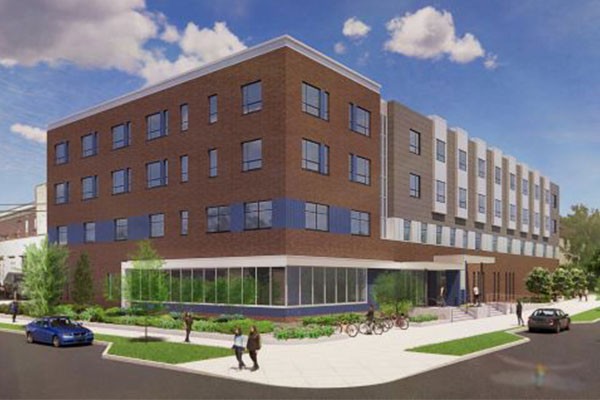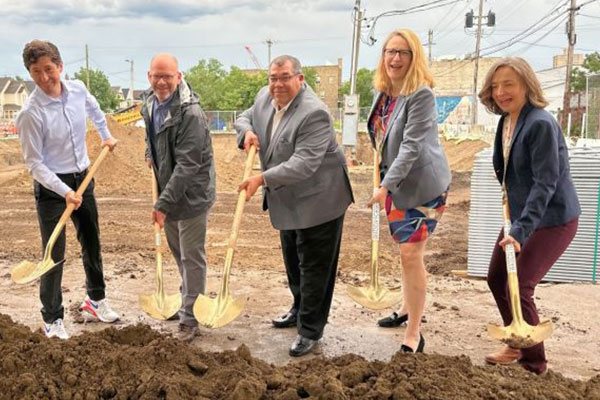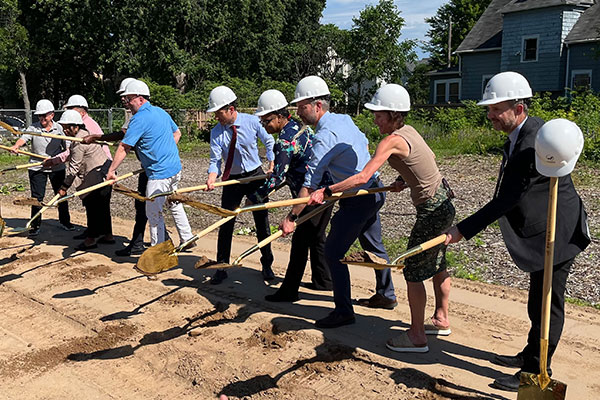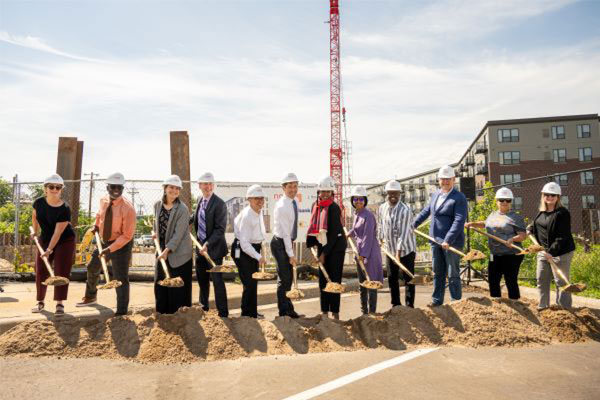New beginnings
Several new affordable housing and shelter developments have broken ground in Minneapolis in recent weeks – the result of historic levels of investment from Hennepin County and other partners.
The new projects will address a significant need for shelter and deeply affordable housing as the region continues to face an affordable housing crisis that disproportionately impacts communities of color.
Hennepin County is a national leader in its work on affordable housing with a focus on reducing disparities and growing housing options for people with the lowest incomes. The county has significant investments in several projects in the development pipeline.
The momentum in affordable housing production will continue as Hennepin County implements its multiphase approach for revenues from the new Metro Area Sales and Use Tax for Housing for metro counties and cities.
The county has released its first request for proposals (RFP) for Repair+Grow. This funding will bolster the capacity of affordable housing property owners. The goal is to start dispersing that funding in 2025.
Opportunity Crossing at 3030 Nicollet

An illustration of the future Opportunity Crossing at 3030 Nicollet.
Hennepin County has invested a total of $6.8 million in deferred loans into Opportunity Crossing – a mixed-use affordable housing development under construction in the Lake & Nicollet area in south Minneapolis.
The 110-unit development, led by Project for Pride and Living (PPL), will rise on the site formerly home to a Wells Fargo bank branch that was destroyed during the 2020 civil unrest. The first floor will feature a new bank branch and ground-floor affordable commercial spaces that will be owned by local business owners of color.
The affordable housing units will include housing opportunities for people exiting homelessness with services provided by PPL, households at or below 30% area median income, and households at or below 50% area median income.
Since the development meets so many of Hennepin County’s housing and economic development priorities, it received significant funding, including:
- $6.19 million deferred loan from pandemic recovery (Affordable Housing Accelerator) funding from two awards issued in 2022 and 2023.
- $750,000 from the Community Investment Initiative.
- $48,454 from the Environmental Response Fund.
The project is a prime example of how Hennepin County is a major contributor to rebuilding the Lake Street corridor.
Simpson Community Shelter and Apartments

An illustration of the Simpson Community Shelter and Apartments development.
The 141-year-old Simpson United Methodist Church that was demolished in late 2023 was a respite for people experiencing homelessness, serving as an emergency shelter for four decades in the Whittier neighborhood of Minneapolis.
By next summer, the site will be transformed into a much more modern and welcoming space that reimagines what a shelter and housing can be in our community. Simpson Housing Services and Project for Pride in Living broke ground on the project at 2740 1st Ave. S. on June 12.
In addition to 72 shelter beds and 42 units of deeply affordable housing, Simpson Community Shelter and Apartments will have a commercial kitchen, a clinic space for Health Care for the Homeless, and extensive on-site services.
Hennepin County supported this project in several ways: a $840,000 deferred loan from Supportive Housing Strategy funding for the housing portion of the development; approximately $87,000 from the Environmental Response Fund; $4 million in capital investments to support construction of the new shelter; and $400,000 in Transit Oriented Communities (TOC) program funding.

Commissioner Marion Greene joins other leaders at the celebration for the Simpson shelter and apartments project.
Simpson Community Shelter and Apartments was one of the first projects funded via Hennepin County’s Supportive Housing Strategy in 2020 – a strategy designed to create housing for people underserved in our housing systems.
This project will utilize Hennepin’s well developed, equitable system for linking those most in need of housing to available units tailored to them, Coordinated Entry. Of the 42 new permanent housing units:
- 30 units will be reserved for chronically homeless people at or below 30% area median income who have been referred by Coordinated Entry.
- Another two units will be reserved for households at 30% of the area median income.
- The remaining 10 units will be reserved for households at 50% of the median.
Agate Housing and Services Shelter and Housing Project

A rendering of the future Agate Housing and Services shelter and housing development.
Agate Housing and Services and Trellis have broken ground on a new project in the Longfellow neighborhood of Minneapolis that will feature 54 shelter beds and 50 affordable homes.
The team held focus groups with people experiencing homelessness to design a shelter and supportive housing that better meets people’s needs. The design plan includes more storage and quiet spaces.

David Hewitt, Hennepin County’s director of Housing Stability (right), at the Agate project groundbreaking celebration.
Hennepin County awarded this project funding from several sources:
- $1 million deferred loan from Supportive Housing Strategy capital, to get this new development built.
- $177,900 from the Environmental Response Fund for site cleanup. Just like the Supportive Housing Strategy, ERF is capital funding intended to help get the development completed.
- $77,000 in ongoing assistance for supportive services. “Ongoing” means that Hennepin will support the project year after year. Over the first 10 years of the project alone, this annual services funding will amount to $770,000 in assistance to the project and its residents.
- $750,000 capital contribution for the shelter portion from Human Services.
Wadaag Commons

The site of the future Wadaag Commons in the Seward neighborhood.
Noor Companies and Redesign Inc. have partnered on Wadaag Commons, a project designed to meet the needs of East African community members with large families.
This 39-unit development in the Seward neighborhood will feature 33 units for households at or below 30% area median income. Of those units, four units will be reserved for households experiencing homelessness with referrals from the county’s Coordinated Entry System. Wadaag means “sharing” or “community” in Somali.
The project also addresses a need for affordable housing for large families with 6 three-bedroom units and 9 four-bedroom units.

The ceremonial golden shovel celebration for Wadaag Commons.
Hennepin County dedicated significant funding for this development, including $600,000 from the Affordable Housing Incentive Fund and $664,771 from the Affordable Housing Development Accelerator.